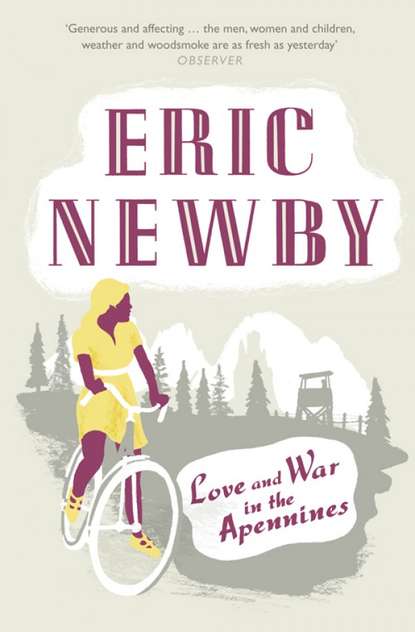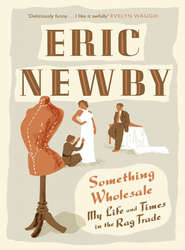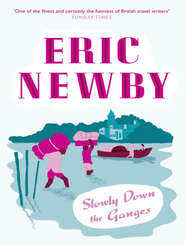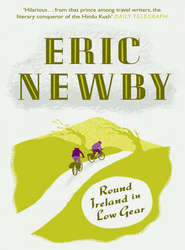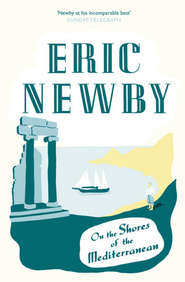По всем вопросам обращайтесь на: info@litportal.ru
(©) 2003-2024.
✖
Love and War in the Apennines
Автор
Год написания книги
2018
Настройки чтения
Размер шрифта
Высота строк
Поля
The foundations had been laid back in 1928, but the work had proceeded so slowly that the war began before it could be completed, and it remained empty until the spring of 1943 when it became a prisoner of war camp for officers and a few other ranks who acted as orderlies.
It was a large, three-storeyed building with a sham classical façade, so unstable that if anyone jumped up and down on one of the upper floors, or even got out of bed heavily, it appeared to wobble like a jelly. To those of us who were lodged on one of these upper floors, it seemed so unstable that we were convinced that if any bombs fell in the immediate neighbourhood it would collapse.
Next door to the orfanotrofio was the santuario in which the miraculous Madonna del Rosario was enshrined, and on its walls there were large quantities of ex-votos contributed by those who had been cured of some bodily affliction or saved from disaster by divine intervention – crutches, pale wax replicas of various parts of the human body that had been restored to health, primitive paintings of ships sinking, houses and barns on fire, or being struck by lightning, motor cars and aeroplanes crashing and farm carts being overturned, from all of which, and many other more fantastic mishaps, the occupants were depicted as emerging or being ejected relatively unscathed.
Behind the santuario, and joined to it, there was a convent in which a body of nuns resided in complete seclusion from which they never emerged except in case of grave illness or when they were being conveyed to another house of their order. Otherwise, their nearest approach to contact with the outer world was when they participated in the masses celebrated in the santuario, at which times they could look out on the congregation in the body of the church unseen, hidden from view behind an iron grille.
All the laundry for the prisoners was done in the convent and from time to time we discovered little notes wrapped up in our clean sheets or tucked inside our shirts, which said that those who had washed them were praying for us and were calling down the blessings of the Madonna del Rosario on our unworthy heads.
Although we never saw them most of us liked having the nuns next door, and the santuario, too. The clanging of its bells broke the monotony of the long days, making the campanile sway with their violence and frightening the swallows, making them sweep in panic to the sky, until some prisoners who had migraine, or were atheists, or simply disliked bells or noise generally, used to put their heads out of the windows and scream, at the top of their voices, ‘I SAY, WOULD YOU MIND TERRIBLY TURNING IT IN?’ And if by chance the bells did stop at that particular moment, ‘THANK YOU SO MUCH!’ Or, if they knew a little Italian, ‘GRAZIE TANTO!’
In the centre of the village, which was called Fontanellato, out of sight of the prisoners in the camp, was the Rocca Sanvitale, a forbidding-looking fifteenth-century castle, isolated behind a water-filled moat. In the castle, until the war came, had lived the Conte Giovanni, the last of the Sanvitales, one of the most ancient and illustrious families in Italy, which, today, is extinct. The buildings which faced the castle had deep, shadowy arcades under which there were shops and cafés where farmers used to congregate on Saturday, which was market day; and in the street which led to the santuario and the orfanotrofio, there was a war memorial of the First World War, which for Italy had been much more bloody than the one she was at present engaged in, with a long list of dead on a plaque at the foot of it. This was more or less all we knew about Fontanellato. Apart from a senior officer who had been taken on a tour of the village for some reason, none of us had ever seen it. What I have written is the sum total of what he told us when he returned. It was rather like listening to a lecture by some medieval traveller and hearing him say, as he pointed to the map, ‘Here be dragons’.
Living in such a grandiose-looking building we felt that we could scarcely be regarded as objects of compassion by the local inhabitants. Although some officers when they arrived at it from other camps complained about the overcrowding, which was severe, and the lack of privacy, which was complete, to me and most of my friends who had been brought here from a much more primitive camp, it seemed a luxurious place and we were very surprised to find that we were to sleep in beds instead of the double-tiered bunks to which we were accustomed.
When we first arrived, at the beginning of March, there was no space for exercise outdoors, apart from a small, wired-in compound behind the building in which we assembled twice a day to be counted, or more frequently if the Italians suspected that someone had escaped; but the Italian commandant, an old, regular colonello, allowed parties of prisoners to go for route marches in the surrounding countryside once a week under a general parole, which covered the period when we were actually outside the gates. Parole or not, we were heavily guarded during these excursions which always followed routes along unfrequented lanes far from any village.
We looked forward to these outings which were sometimes cancelled at the eleventh hour for unexplained reasons, or because the senior officers refused to come to terms on some piddling point of military etiquette which most of the people in the camp, being temporary soldiers, and almost none of the Italians, because there were only about two regular soldiers among them, were ever able to comprehend. As in every other prison camp, the most lively differences of opinion between the senior British officer and the colonello and his staff arose over the interpretation of the various clauses of the Geneva Convention, which governed the treatment of prisoners.
We marched at a tremendous rate, glad of the exercise and taking sadistic pleasure in exhausting our guards who were mostly small men with short legs. We marched along flat, dusty roads; past wheat fields; fields in which forests of Indian corn were growing and into which I longed to take flight; along the foot of high green embankments which protected the land from the torrents which at certain seasons poured down from the Apennines into the River Po; past huge fields of tomato plants and sugar beet, groves of poplars, endless rows of vines and great rambling farmhouses with farmyards full of cows and pigs and ducks and geese, and red-roofed barns with open doors in which we could just see great, mouth-watering Parmesan cheeses ripening in the semi-darkness. Where we went we saw very few people. Perhaps they were told to keep out of the way when we went past.
Looking at this burgeoning countryside in the spring and summer of 1943 it was difficult for the most optimistic of us to believe that Italy was in danger of collapsing through lack of food, although it was obvious that the Italian army was very badly fed. One had only to look at the exiguous rations which the soldiers who guarded us drew from their cookhouse. And here, so far as I could make out, there were no organisations as there were in Britain to make their life more supportable. No volunteer ladies dishing out fish and chips to them, and great squelchy, jam sandwiches, and cups of orange-coloured tea, and, saying ‘Hello’ and asking where they came from, making them feel that they were doing something worthwhile which somebody cared about. They were like souls in limbo or a lot of untouchables in Hindu India, lost in the low-lying ground which no one ever visited, somewhere between the railway workshops and the cantonment.
By prison standards, the food in the orfanotrofio was good. The official rations were not abundant for non-manual workers, which is what we were, and without anything to augment them they had a lowering effect, especially in the previous camp where the British cooks had usually succeeded in making the worst of them – their version of pasta al sugo being particularly loathsome; to me it always smelt of dirty dish cloths.
But here, at Fontanellato, for the first time since I had been captured, there was a regular supply of Red Cross parcels and instead of the parcels being issued complete for us to make what we would of the contents, as had been done in other places, here all the cookable food was removed and prepared in the kitchens. This was much more civilised than keeping a lot of open tins under one’s bed, as some of us had previously done (the Italians never allowed us to have unopened tins in case we hoarded them for an escape) and risking death by eating the contents of a tin of disgusting meat loaf that had been open for two or three days or, even worse, spending ages on all fours blowing away at a stove made from old tin cans, stoked up with bits of cardboard or, in extremis, pieces of bed board from the bottom of our bunks, as many had done in the past.
Drink and supplementary food were bought on the black market, which was even more extensive and better organised than it was in Britain, and a special float of Red Cross cigarettes was kept for this purpose and for the general corruption of the Italian camp staff, by responsible members of the British administration, ex-bank managers mostly, to whom this sort of thing was second nature.
Officially, we were allowed one tot of vermouth and one of wine each day by our administration, which was all that could be allowed if, in theory, everyone took their ration; but you could always buy other people’s ration tickets with cigarettes or chocolate if you preferred drinking to smoking. Because of this there were some good parties and some rather awful ones too.
The very first lieutenant-colonel who was sent to us, previously we had scarcely anyone above the rank of captain, gave a memorable one.
‘Well, good night gentlemen,’ he said when most of the drink was finished. ‘Time for bed.’
He opened the door of a tall cupboard which stood against the wall and walked into it shutting the door behind him, presumably under the impression that he was entering his own room. By the time it had been forced open, which was difficult because his rather ample trousers had caught in it, he was fast asleep. He was a nice, high-spirited old man, much too old in years to have been captured fighting in the Western Desert.
The wines were strange, dark and repulsive with various chemical additives, what the Italians call vini lavorati, worked on, primitive harbingers of the more sophisticated, doctored wines which rarely contain any grapes at all and which have made the Italian wine industry the byword that it is today; but like meths drinkers we enjoyed them better than no alcohol at all.
There was even a bar in which these concoctions were served, high up in a sort of minstrels’ gallery above the chapel, which was used by the more staid prisoners to play bridge, and on Sundays for church services. We were forbidden by the Italians to look out of the windows of the bar which faced the road to the village, and if we did, the sentries in the watchtowers beyond the wire used to fire shots at us, some of which used to come whistling through the windows – the glass had been blown out long ago – and bury themselves in the walls and ceiling of the bar which had the same ecclesiastical decor as the chapel below. These bullet-holes gave the place a raffish appearance, like a middle-western saloon built by some renegade, gun-toting priest.
But in spite of these fusillades we still continued to risk our lives by putting our heads out of the windows, in order to be able to look at the girls of Fontanellato who, every evening when the weather was fine, used to promenade along the road in front of the orfanotrofio.
Some of my fellow prisoners had not spoken to a girl since they had been captured in 1940. Old or new prisoners, few of us had set eyes on girls like these for years and years. They were all shapes and sizes and colours and as they went past they laughed, as if enjoying some private joke, and tossed their heads impertinently in our directions. They all had long hair, short skirts and brown, bare legs and, as they swayed along the road, the high-heeled wooden sandals, which they all wore because there was very little shoe leather in Italy, clacked on the hard surface of the road. Some of them walked arm in arm with other girls carefully chosen for their inferior looks; some were so sure of themselves that they walked with girls who were their equals; others wobbled past in little flocks on bicycles, so slowly that they sometimes fell off uttering squeals of alarm – none was ever injured. There were scarcely ever any men with them. Presumably they were at the war.
The effect of these visions on the wretched Italian guards who were immured high up in their watchtowers, was as powerful as it was on us. Utterly distracted, they turned their backs on the orfanotrofio in order to look at them more closely, until some N.C.O., old enough and sour enough to be indifferent to women, screeched at them so loudly that they whirled round and, seeing us, discharged their rifles in the direction of the bar.
But not even the Italian Army in its most bellicose mood was able to stop us looking at the girls of Fontanellato, or the girls at us.
On one side of the orfanotrofio was the village cemetery in which the dead were stacked in recesses in the walls, one above the other, as if they had been put away carefully in some giant filing-cabinet marked ‘Pending’ until the last Trump sounded. Every Sunday, wet or fine, what must have been almost the entire girl population of Fontanellato as well as large numbers from the surrounding country, used to make the long pilgrimage up the via Cimitero to the gates, ostensibly to mourn their loved ones, and completely outnumbering the real mourners who could be easily distinguished by their black garb. If all these girls had been visiting the graves of their own kith and kin then the cemetery would have had to have been at least five times the size it was. Like participants in a slow-motion film they crawled past the front of the orfanotrofio, past the exercise field which had been opened a month after our arrival, and in which all exercise ceased from the moment the first of them came into view, and turned left up the road to the cemetery. Few of them bothered to enter it. Sometimes they waved if they thought the guards were not watching, or they might simply twirl a scarf, and from behind the barbed wire in the field and from every upper window of the orfanotrofio, from which the occupants could also see on fine days, and equally unattainable, the peaks of the pre-Alps beyond Lake Garda, more than 150 kilometres away to the north, the prisoners cheered and waved at them.
But in spite of these distant encounters with girls we were not unduly troubled by the lusts of the flesh – perhaps it was something to do with the diet. As one of my friends said, after drawing on himself one or two random shots while craning out of one of the windows of the bar, ‘It isn’t that one just wants to poke them. I’m not sure if I could do it any more, but it would be heaven just to be with them,’ which for him was a pretty profound remark.
It was fortunate that most of us felt as he did. Had we felt otherwise there was not much we could do about it except pull our puddings, and to perform the operation while lying cheek by jowl with twenty-six other people in a room which was illuminated by searchlights, required a degree of stealth which had deserted most of us since leaving school. Nevertheless, some of the more vigorous among us revived these ancient skills.
The lavatories – the gabinetti – were even more unsuitable than the dormitories for this purpose. They were of the kind in which you squatted over a dark hole in the floor and at unpredictable intervals a huge head of water like the Severn Bore came swirling up and filled your boots. It was hazardous enough using the gabinetti for the purpose for which they had been constructed without lingering in them, even to study the astonishing graffiti which can only have been produced by people who owned wellington boots. One officer made a fortune in cigarettes, which were the hard currency of the camp, salvaging valuable objects such as lighters, false teeth and wrist watches which their owners had dropped down the holes while occupying the gabinetti and which had gone round the bends in the pipes.
Even more difficult for the residents in the orfanotrofio was any kind of homosexual act. Whatever loves there were between prisoners could only be expressed by looks and words or perhaps a surreptitious pressure of the hand, otherwise they had to remain locked away within the hearts and minds of the lovers until they could be free or were moved to some more private place.
(#ulink_50ef4b7d-d692-5e1f-9dce-035e35ea178a)
Although they were outnumbered by officers drawn from the middle and lower classes who had had to be commissioned, just as they had been in the First War, because there were not enough members of the upper class to go round, it was the upper class which set the style in the orfanotrofio, just as they had done in the pre-war world outside; the sons and younger brothers of peers and Highland lairds, young merchant bankers, wine shippers and gentlemen jockeys who had ridden in the National, most of them concentrated in cavalry regiments, rifle regiments, one or two Highland regiments and the Brigade of Guards. These amateur soldiers, for they were mostly amateurs, and any professional soldiers who had the same sort of background (any others were soon made into figures of fun), made up the coteries of O.K. people who exercised power.
These people were very reluctant to consort with outsiders, but as the orfanotrofio was very overcrowded and it was almost impossible to summon up a coterie large enough to take over one of the bigger rooms which contained anything up to twenty-seven beds, and because these rooms were the most desirable because they were on the side of the building which faced away from the afternoon sun, and because not all coteries found other coteries agreeable to them for innumerable reasons which there is no space to go into here, the members always tried to ensure that the rest of the beds were occupied with what they regarded as more or less acceptable ballast, that is to say, or as they would have said if they had actually said it out loud, marginally O.K. people, the sort of people they were prepared to talk to and drink with while the war was on, and then would never see again. And this included a number of people whom they regarded as being downright common but who had the saving grace of being funny; and they took these comics on to the strength in much the same way as their ancestors had employed jesters and dwarfs, to while away the tedious hours between breakfast, lunch and dinner. Everyone else they ignored completely, unless they owned something worth buying, or had some skill which they could make use of to increase their comfort. It was not that they consigned these unfortunates to outer darkness; they simply never invited them in out of it.
If I had not had marginally O.K. friends who had not abandoned me when we moved to the orfanotrofio from the camp in which we had previously been imprisoned I, too, would have become a dweller in darkness, which I did not want to be. I wanted the opportunity to observe the O.K. people at close quarters and some inner voice told me, quite correctly for once, that this was going to be my last chance ever to do so in the whole of my life.
Before the war I had rarely spoken to O.K. people, let alone known any well enough to talk to. Even at Sandhurst in 1940, where I was a member of the Infantry Wing in the Old Buildings, which were so much more elegant than the New Buildings, O.K. people had been rarities. They were accommodated in the hideous New Buildings, which were not really new at all but were newer than the old ones; or else they were members of something called The Royal Armoured Wing – I now forget where they lived – which had to do with armoured fighting vehicles and therefore with what was still called the Cavalry, which was nothing to do with the Royal Tank Regiment and still isn’t, thirty years later.
When I was very young I sometimes used to see what I immediately recognised as midget versions of O.K. people in Children’s Hairdressing on the first floor at Harrods, to which my mother, who had been a model girl at the store and had a nostalgia for the place, used to take me from Barnes to get my hair cut, where they exercised themselves on the rocking horses while waiting to be given the treatment and never let me have a go. I used to see them, too, wearing hand-made overcoats with velvet collars and long gaiters with hundreds of buttons down the sides, the sort of outfit which would have caused any un-O.K. child to have a fit of apoplexy in the mild spring weather in which they were dressed like this, being pushed up Sloane Street in huge, glossy machines known as Victoria carriages, which were short-wheelbase prams with curled up fronts, like seashells, in which they travelled sitting more or less upright with their backs to whoever was pushing them and, usually, with a dark blue blanket clipped over the front with their initials, or their parents’ initials, embroidered on them, on their way to the Dell, a charming grassy depression on the far side of Rotten Row, in the Park. They were still being conveyed about in these carriages at an age when I had long forgotten what it was like to be in a push-chair, which was what I had had to make do with after my nanny had been shown the door.
The nurses who had the pushing of these little O.K. boys who sat, as it were, with their backs to the engines, were invariably bad-tempered looking and absolutely hideous. They wore porkpie hats with badges on them, long, drab overcoats of putty-coloured gabardine or grey flannel, with lisle stockings to match, and clumpy great shoes; not like my very sexy suburban nanny who wore a uniform bought for her by my mother – who had not been a model girl for nothing – a blue denim dress in summertime with stiff white collar and cuffs and black silk stockings and high-heeled shoes, and whose head was swathed in some sort of dark blue veiling when she took me out for an airing, often to have assignations with what looked to me like very old men but were probably quite young ones, in a graveyard, not in fashionable S.W.1 but in S.W.13, keeping me quiet while she did whatever she did with them by giving me handfuls of Carrara marble chippings from the tombs to play with. (She was fired when my mother found me still playing with them in the bath.) If this nanny, of whom photographs still exist in an album, which enables me to remember more clearly than I would otherwise have been able to do what she looked like, had taken me to the Dell, the other nannies would have ignored her, not only because she was far too good looking to be a nanny, but because I was not an O.K. child.
Whatever else I may have envied them I certainly did not envy these little O.K. boys their nannies.
‘Why is the sky blue, Nanny?’ I heard one ask in the bell-like upperclass voice which I envied and always wished that I could emulate – mine sounded as if it emanated from my boots. To which he got the reply, ‘Ask no questions and you’ll be told no lies, little Mr Inquisitive.’
And later when we were all a bit older, and I was on my way to or from the dentist, also in S.W.I, with my mother’s ‘Help’, I sometimes used to see a shambling crocodile of them, all wearing the strange-looking, tomato-coloured caps of a smart pre-prep school, which looked like the sort of caps that some Irish peasants still wear, being shepherded along the road by a number of brisk grown-ups, all wearing no-nonsense-from-you expressions.
‘Well-born they may be, Master Eric,’ the ‘Help’ said stoutly, when they had shuffled past, ‘but most of them look half-barmy to me.’ And when the war came and I was on embarkation leave I saw them again in Harrods, in various splendid uniforms with their mothers and sisters and girl friends who all wore miniature replicas of their regimental badges picked out in diamonds, and again listened with awe to their loud, self-confident voices, usually we were ascending or descending together in one of the lifts, slightly cracked versions of the bell-like tones I had listened to with envy on the way to the Dell sixteen years before. But this was the first opportunity I had had to consort with them and study them at leisure and en masse.
In the camp the members of the coteries moved easily in a mysterious, almost Edwardian world and when they addressed one another they used nicknames, just as the Edwardians had been so fond of doing, which were completely unintelligible to anyone else, and they knew who was who so far down the scale of the aristocracy to a point at which one would have thought that any blue blood corpuscles would have been non-existent. They alone knew that ‘Bolo’ Bastonby was the nephew of the Earl of Crake, that ‘Jamie’ Stuart Ogilvie-Keir-Gordon was the youngest brother of the Master of Dunreeking and that ‘Feathers’ Farthingdale was the third son of the Marquis of Stale by his second wife. No one outside these coteries had even heard of the holders of the titles, let alone ‘Bolo’ Bastonby, ‘Jamie’ Stuart Ogilvie-Keir-Gordon or ‘Feathers’ Farthingdale.
One interesting thing I noticed about them, and this applied to almost all of them, was that they would not tolerate any criticism by outsiders of anyone whom they regarded as being ‘one of us’, even though the person being criticised might be hundreds of miles away.
Down at the marginally O.K. end of the otherwise O.K room which I inhabited, there was an officer in a very grand regiment who was not completely accepted by the coterie because none of them knew anything about his family and because he had been commissioned from the ranks of the same regiment in peacetime, a rare thing and one that implied that he probably possessed gifts which, in such a regiment, might take him to the heights of his profession and one that most marginally O.K. and un-O.K. people in the orfanotrofio who knew about it, regarded as ‘a good thing’ or ‘a good show’. And because he was in such a grand regiment he was allowed more latitude than the average marginally O.K. resident. But one evening he went too far.
‘I think Randolph Churchill’s a shit,’ he said, in the course of a long, rambling, semi-drunken conversation about the past which had temporarily united the two ends of the room. And from the other end of it, like an echo that had somehow gone wrong, came a passionate cri de coeur from someone who – I happened to know, because he had himself told me so on a previous occasion – had never met Randolph Churchill in his life, and everyone else at his end of the room, some of whom did know Randolph Churchill well, knew it too.
‘How dare you say that! Randolph’s a personal friend of mine!’ He spoke in exactly the same voice as one of the little boys in Children’s Hairdressing in Harrods had when I tried to get a ride on the rocking horse which he had been astride ever since I arrived. ‘Go away!’ he said to me. ‘It’s my rocking horse!’
The next morning while we were out in the courtyard being counted by the Italians I asked Alastair why he had sprung to the defence of Randolph Churchill whom he had never met and might, for all he knew, be a shit.
‘I don’t care whether Randolph Churchill’s a shit or the sun shines out of his arse,’ he said, ‘I just can’t bear little men like that saying that kind of thing. Someone had to teach him a lesson. He had it coming to him.’
The ‘little man’ he was giving the lesson to was well over six feet tall.
Although some members of the coteries could be described, without irony, as being ‘cultivated’, none by the wildest stretch of the imagination could be said to be ‘intellectual’. The intellectuals in the camp, of whom there were not many, were most of them not even marginally O.K. One, who subsequently became a very successful leader of the Italian partisans, was regarded as being what they described as ‘Bolshie and odd’; not because he was not a good soldier, which they had to admit he was, but because every opinion that he held was completely at variance with their own – about the war and why it was being fought and why he was fighting it, and about the sort of Britain which would emerge as a result of it – and, most suspicious of all, he actually learned to read and write Italian while he was in the orfanotrofio.





